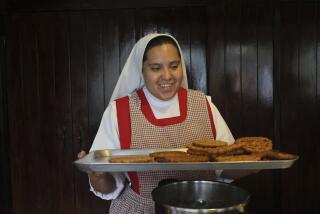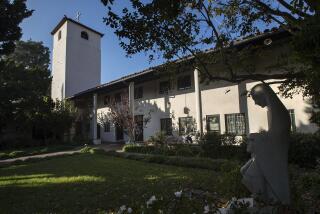Mission Possible : 2 Thousand Oaks Nuns to Head for Ugandan Village to Build School, New Lives
- Share via
Textbooks will be the last thing on the minds of Sister Jane Marie McHugh and Sister Margaret Mary Scott when they leave Thousand Oaks next week for Uganda to start a school in an isolated rural village. Their first worries will be chickens, goats and bananas--the food they must raise to sustain them while the school is being built.
“I’m ready to begin a new life,” said McHugh, 47, sitting in the Sisters of Notre Dame Convent in Thousand Oaks, bare-headed, in a skirt, blouse and Birkenstocks. “It’s like nothing I’ve ever done before. It’s like a new birth for me.”
McHugh and Scott hope their mission also will be a new birth for Buseesa, Uganda, a village lying four hours from any major city. It is so small it does not appear on regional maps and has no electricity or running water.
“There is a cycle of poverty that is never going to end,” McHugh said. “Education is the main piece to ending that cycle, and we’re going to do our part.”
The sisters talk little about converting the villagers, saying only that they are going because God deems it so. The area, they say, already is primarily Catholic, thanks to missionaries who went there in the early 1900s.
Instead, they and two nuns from an order in Covington, Ky., will use their extensive backgrounds in education to teach villagers how to raise themselves out of poverty. The sisters also hope to improve the plight of women by taking girls out of separate, inferior schools.
Scott was the director of religious education at Sacred Heart Parish in Saticoy before quitting to prepare for Uganda. McHugh, a former principal of St. Paschal Baylon School in Thousand Oaks, was more recently principal of a Catholic junior high school in South Central Los Angeles.
In Uganda, the sisters’ boarding school will accept 30 of the brightest first- through seventh-grade boys and girls from Buseesa and six other villages in the Hoima region. Currently, the students are educated in dilapidated shacks by teachers who themselves have barely a seventh-grade education. “We hope the kids we teach will go on to secondary education and college and come back to the village, bringing knowledge of technology and medicine,” Scott said.
*
A major roadblock to receiving secondary education in Uganda is a test that all seventh-graders must take. The test is given in English, and although English is the official language of Uganda, most people living in outlying areas speak a tribal dialect. McHugh said only 15 students of nearly 3,000 living in Hoima passed the most recent test.
The sisters have been learning the Banyoro dialect through makeshift tapes and books compiled by the diocese in Buseesa. There are no formal teaching aids translating Banyoro into English.
In addition to studying the language, the sisters have been learning survival skills. They took an intensive training course at UC Davis to learn how to farm, raise goats, chickens and other small animals for food and tend orchards for fuel for their wood stoves.
“We know more about chickens than you could possibly imagine,” McHugh said. “No one will be able to sell us an old hen that’s past her egg-laying prime. We know what to look for.”
The sisters also have taken a course in auto mechanics at Ventura College in case their four-wheel-drive truck--which will be the only automobile for miles--breaks down.
They say the toughest survival skill to learn has been Morse code. They need it to receive their ham radio license so they can communicate with the outside world, because there are no telephones, fax machines or televisions in Buseesa.
“It’s so tedious,” Scott said.
But they said the training should pay off. The Ugandan school is the first mission started by the California province of the Sisters of Notre Dame and is funded solely by the order.
Both sisters talk of a calling to educate rural villagers in a place where the average life span is 37 years and AIDS orphans thousands of children each year. They hope their mission--which has no ending date--will eventually sustain itself as educated students come back to teach at the school.
“The ultimate goal is to work ourselves out of a job,” McHugh said.
More to Read
Sign up for Essential California
The most important California stories and recommendations in your inbox every morning.
You may occasionally receive promotional content from the Los Angeles Times.










